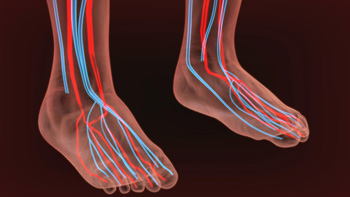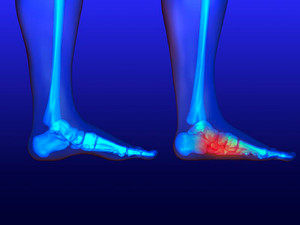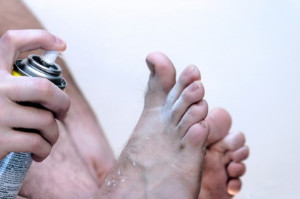 A plantar wart is defined as a wart on the sole of the foot. It grows inward as a result of the pressure the feet endure on a daily basis, and can cause severe pain and discomfort. They appear to be flat, and many plantar warts have small, black specs in the center that are tiny blood vessels. Warts can be contagious, and are caused by a fungus that lives and thrives in warm and moist environments. These environments include public swimming pools, shower room floors, and surrounding areas. It is important to refrain from sharing shoes, socks, and towels, as this may limit the spread of plantar warts. There are effective treatment methods available, and it is suggested that you consult with a podiatrist who can determine which one is best for you.
A plantar wart is defined as a wart on the sole of the foot. It grows inward as a result of the pressure the feet endure on a daily basis, and can cause severe pain and discomfort. They appear to be flat, and many plantar warts have small, black specs in the center that are tiny blood vessels. Warts can be contagious, and are caused by a fungus that lives and thrives in warm and moist environments. These environments include public swimming pools, shower room floors, and surrounding areas. It is important to refrain from sharing shoes, socks, and towels, as this may limit the spread of plantar warts. There are effective treatment methods available, and it is suggested that you consult with a podiatrist who can determine which one is best for you.
Plantar warts can be very uncomfortable. If you need your feet checked, contact Dr. Richard DiMario from Maine. Our doctor will assist you with all of your foot and ankle needs.
About Plantar Warts
Plantar warts are the result of HPV, or human papillomavirus, getting into open wounds on the feet. They are mostly found on the heels or balls of the feet.
While plantar warts are generally harmless, those experiencing excessive pain or those suffering from diabetes or a compromised immune system require immediate medical care. Plantar warts are easily diagnosed, usually through scraping off a bit of rough skin or by getting a biopsy.
Symptoms
Treatment
To help prevent developing plantar warts, avoid walking barefoot over abrasive surfaces that can cause cuts or wounds for HPV to get into. Avoiding direct contact with other warts, as well as not picking or rubbing existing warts, can help prevent the further spread of plantar warts. However, if you think you have developed plantar warts, speak to your podiatrist. He or she can diagnose the warts on your feet and recommend the appropriate treatment options.
If you have any questions please feel free to contact our office located in York, ME . We offer the newest diagnostic and treatment technologies for all your foot and ankle needs.
Peripheral artery disease ( PAD) is a condition that causes poor blood flow to the lower extremities. This is due to a buildup of plaque along the walls of the arteries, causing them to narrow and become stiff and thus restricting blood flow. According to a recent study, people with rheumatoid arthritis (RA), an autoimmune disorder that affects the joints, appear to be at an increased risk of developing PAD. Fortunately, both PAD and RA can be managed. A podiatrist can screen for PAD and recommend treatment options for both conditions. If you have poor circulation to your lower limbs or arthritic joint pain in your feet and ankles, it is suggested that you consult with a podiatrist.
PAD) is a condition that causes poor blood flow to the lower extremities. This is due to a buildup of plaque along the walls of the arteries, causing them to narrow and become stiff and thus restricting blood flow. According to a recent study, people with rheumatoid arthritis (RA), an autoimmune disorder that affects the joints, appear to be at an increased risk of developing PAD. Fortunately, both PAD and RA can be managed. A podiatrist can screen for PAD and recommend treatment options for both conditions. If you have poor circulation to your lower limbs or arthritic joint pain in your feet and ankles, it is suggested that you consult with a podiatrist.
Peripheral artery disease can pose a serious risk to your health. It can increase the risk of stroke and heart attack. If you have symptoms of peripheral artery disease, consult with Dr. Richard DiMario from Maine. Our doctor will assess your condition and provide you with quality foot and ankle treatment.
Peripheral artery disease (PAD) is when arteries are constricted due to plaque (fatty deposits) build-up. This results in less blood flow to the legs and other extremities. The main cause of PAD is atherosclerosis, in which plaque builds up in the arteries.
Symptoms
Symptoms of PAD include:
It is important to note that a majority of individuals never show any symptoms of PAD.
Diagnosis
While PAD occurs in the legs and arteries, Podiatrists can diagnose PAD. Podiatrists utilize a test called an ankle-brachial index (ABI). An ABI test compares blood pressure in your arm to you ankle to see if any abnormality occurs. Ultrasound and imaging devices may also be used.
Treatment
Fortunately, lifestyle changes such as maintaining a healthy diet, exercising, managing cholesterol and blood sugar levels, and quitting smoking, can all treat PAD. Medications that prevent clots from occurring can be prescribed. Finally, in some cases, surgery may be recommended.
If you have any questions, please feel free to contact our office located in York, ME . We offer the newest diagnostic and treatment technologies for all your foot care needs.
 It can be easy to notice if you have flat feet. The entire foot will lie flat on the floor without a space where the arch would normally exist. The majority of babies are born with flat feet, and the arch typically develops at approximately six years of age. Patients who have flat feet may have an abnormal foot structure or weak muscle tone. Additionally, the ligaments may be loose, and this may be caused by genetic traits. Some of the symptoms that are associated with flat feet can include possible pain or tenderness in the foot, lack of energy, and it may be difficult to walk. The Achilles tendon may become inflamed, and foot conditions such as bunions may develop. It is advised for people who have flat feet to be under the care of a podiatrist who can offer effective relief methods, which may include wearing orthotics.
It can be easy to notice if you have flat feet. The entire foot will lie flat on the floor without a space where the arch would normally exist. The majority of babies are born with flat feet, and the arch typically develops at approximately six years of age. Patients who have flat feet may have an abnormal foot structure or weak muscle tone. Additionally, the ligaments may be loose, and this may be caused by genetic traits. Some of the symptoms that are associated with flat feet can include possible pain or tenderness in the foot, lack of energy, and it may be difficult to walk. The Achilles tendon may become inflamed, and foot conditions such as bunions may develop. It is advised for people who have flat feet to be under the care of a podiatrist who can offer effective relief methods, which may include wearing orthotics.
Flatfoot is a condition many people suffer from. If you have flat feet, contact Dr. Richard DiMario from Maine. Our doctor will treat your foot and ankle needs.
What Are Flat Feet?
Flatfoot is a condition in which the arch of the foot is depressed and the sole of the foot is almost completely in contact with the ground. About 20-30% of the population generally has flat feet because their arches never formed during growth.
Conditions & Problems:
Having flat feet makes it difficult to run or walk because of the stress placed on the ankles.
Alignment – The general alignment of your legs can be disrupted, because the ankles move inward which can cause major discomfort.
Knees – If you have complications with your knees, flat feet can be a contributor to arthritis in that area.
Symptoms
Treatment
If you are experiencing pain and stress on the foot you may weaken the posterior tibial tendon, which runs around the inside of the ankle.
If you have any questions please feel free to contact our office located in York, ME . We offer the newest diagnostic and treatment technologies for all your foot and ankle needs.
 Athlete’s foot, also known as tinea pedis, is a fungal infection of the skin on the feet. The types of fungus that cause athlete’s foot thrive in moist, warm, dark environments and multiply easily on irritated or weakened skin. Symptoms of this infection include itchy, sore, or scaling skin between the toes, and a burning sensation in the affected areas. Your feet may also develop an unpleasant smell. Left untreated, blisters may form on the feet and eventually break open, exposing raw skin and potentially leading to secondary bacterial infections. If you have athlete’s foot, it is recommended that you seek medical treatment, as this infection can also spread to other parts of the body. Consult with a podiatrist if you notice that you have symptoms of athlete’s foot.
Athlete’s foot, also known as tinea pedis, is a fungal infection of the skin on the feet. The types of fungus that cause athlete’s foot thrive in moist, warm, dark environments and multiply easily on irritated or weakened skin. Symptoms of this infection include itchy, sore, or scaling skin between the toes, and a burning sensation in the affected areas. Your feet may also develop an unpleasant smell. Left untreated, blisters may form on the feet and eventually break open, exposing raw skin and potentially leading to secondary bacterial infections. If you have athlete’s foot, it is recommended that you seek medical treatment, as this infection can also spread to other parts of the body. Consult with a podiatrist if you notice that you have symptoms of athlete’s foot.
Athlete’s foot is an inconvenient condition that can be easily reduced with the proper treatment. If you have any concerns about your feet and ankles, contact Dr. Richard DiMario from Maine. Our doctor will treat your foot and ankle needs.
Athlete’s Foot: The Sole Story
Athlete's foot, also known as tinea pedis, can be an extremely contagious foot infection. It is commonly contracted in public changing areas and bathrooms, dormitory style living quarters, around locker rooms and public swimming pools, or anywhere your feet often come into contact with other people.
Solutions to Combat Athlete’s Foot
Athlete’s foot can cause many irritating symptoms such as dry and flaking skin, itching, and redness. Some more severe symptoms can include bleeding and cracked skin, intense itching and burning, and even pain when walking. In the worst cases, Athlete’s foot can cause blistering as well. Speak to your podiatrist for a better understanding of the different causes of Athlete’s foot, as well as help in determining which treatment options are best for you.
If you have any questions please feel free to contact our office located in York, ME . We offer the newest diagnostic and treatment technologies for all your foot and ankle needs.